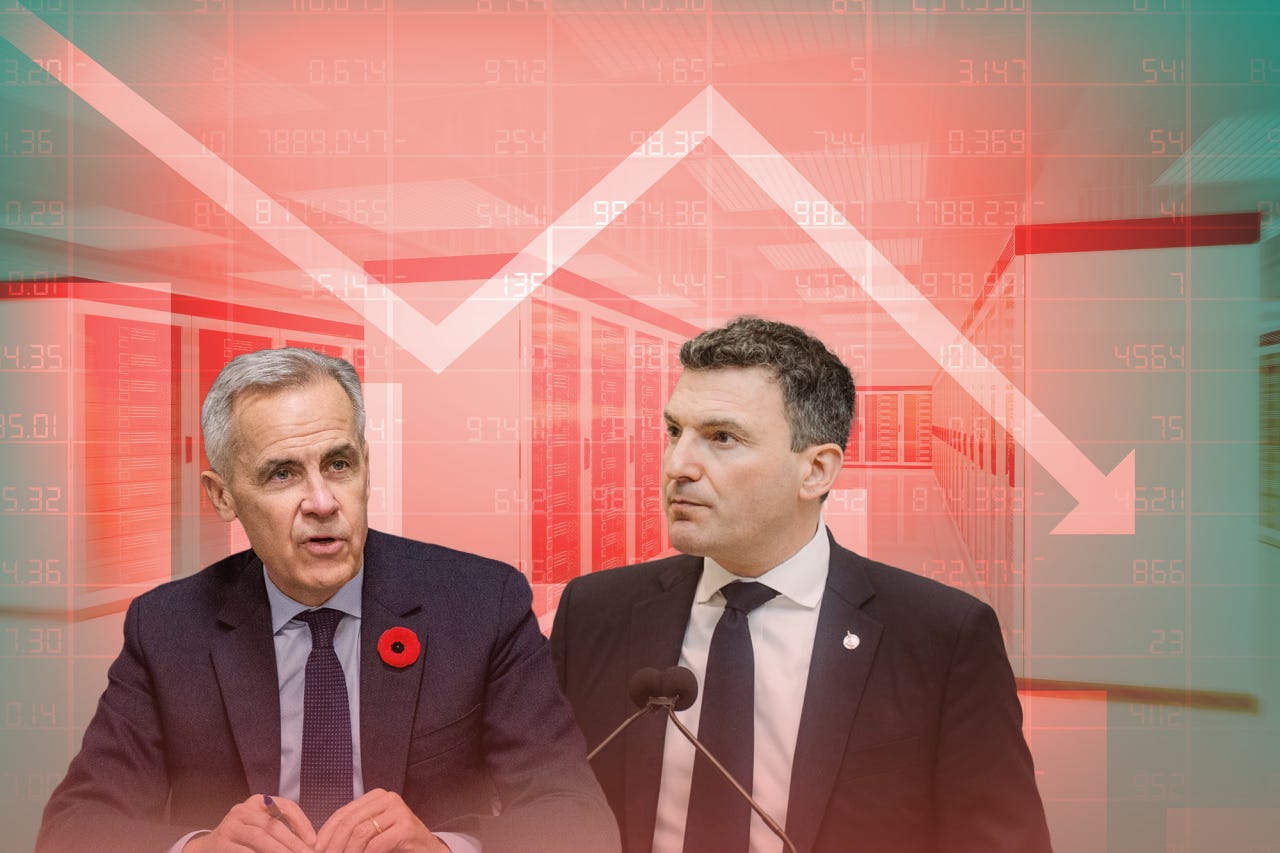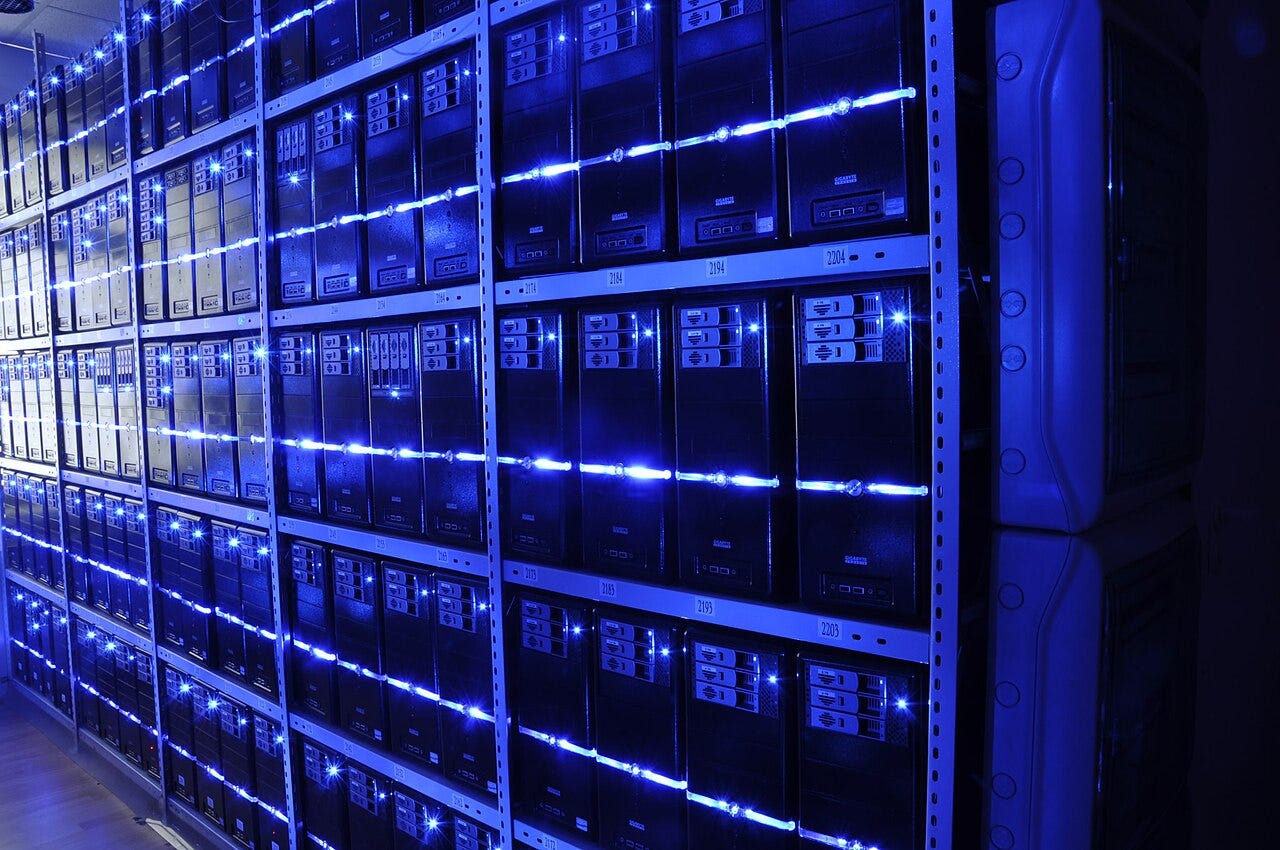The AI bubble may be about to burst. Mark Carney must not bail out its Tech Barons
While billionaires bet against the hyped up multi-trillion-dollar AI market, Canada’s government is doubling down
Hi friends - This one is for the Canadians - eh? :-) published today in The Breach. See original here.
To be clear the AI bubble may or may not burst this week.. but I think it’s pretty locked in. It is a bubble. It will burst in the near future. Government’s number one job on all things AI should now be to protect society from AI fragility not to keep heightening that fragility.
Nov 18 2025
While Canadian politicians are still caught up in their AI love affair, panic is rippling through the industry—and the AI bubble may be about to burst, with massively damaging consequences for Canada.
Billionaires are bailing on AI stocks, and even tech giants are preparing for a correction that could send a colossal tremor through markets and public pension funds.
Over the weekend, it was revealed that Peter Thiel, the billionaire founder of software firm Palantir, dumped all of his personal investments in Nvidia, the U.S. chipmaker whose products make generative AI possible.
By betting on that company’s sale of chips to Google, Meta, Amazon and OpenAI, investors have pumped up Nvidia to the extent that it is single-handedly responsible for over a quarter of all gains in the stock market over the past three years.
Nvidia is now the world’s first-ever company to be valued at $5 trillion—a staggering overvaluation that many have predicted will be “corrected,” perhaps dramatically.
The news that Thiel, who has been called the “dark lord of Silicon valley,” decided against keeping any Nvidia stock in his own portfolio (it had made up nearly 40 per cent) may become one of the factors hastening that now inevitable correction.
Thiel’s exit happened only a few days after Japanese giant Softbank publicly withdrew its entire $5.83 billion investment in Nvidia. It also comes a couple of weeks after charismatic investor Michael Burry (known for making $800 million by betting against the housing market during the 2008 recession, inspiring the film The Big Short) placed his own billion-dollar “short” against both Nvidia and Palantir. He then shut up shop to wait out the coming crash.
Deutsche Bank, which is apparently also exploring shorting AI stocks, has warned that without the oodles of money currently being spent by AI companies to build data centres filled with pricey Nvidia chips, the U.S. economy would already be in deep recession.
It turns out that just a few tech giants splashing out on data centres, electricity, and chips are now outspending the entire American consumer population.
Unfortunately for us ordinary Canadians, who don’t have multi-billion dollar hedge funds to play shorting games with, the prospect of an enormous implosion of AI stocks might prove profoundly consequential.
Minister of Artificial Intelligence and Digital Innovation Evan Solomon with Prime Minister Mark Carney. Credit: Evan Solomon/X
Ottawa is doubling-down instead of pulling back
At the end of September the Canadian Pension Plan Investment Board (CPPIB), to which all working Canadians outside Quebec are subscribed, held $8 billion of Nvidia stock as its largest single equity holding. In fact, its eight largest stock holdings were all AI stocks. At $33 billion of combined value, these holdings amount to a quarter of the value of the entire pension fund.
Quebec’s main pension fund, La Caisse de dépôt et placement du Québec (CDPQ), also reported Nvidia as its largest holding at the end of September. Almost all of the “Maple Eight” big pension funds also lead with Nvidia and other AI stocks as their largest holdings, or they are loaded up on index funds that are in turn overloaded with Nvidia and other AI stocks.
What happens then to the financial security of ordinary people if the value of these stocks collapses overnight? According to Deutsche Bank, there is “no playbook” to deal with the potential fallout from an implosion in AI stocks. The Bank of Canada, meanwhile, says it doesn’t know what the wider impact of an AI correction would be.
This isn’t good enough. Until federal and provincial governments can clearly explain what an AI crash would mean for 40-plus million Canadians, public servants and pension managers should already be moving to follow Thiel, Softbank, and Burry, acting now to shield the rest of us from the increasingly likely collapse of this bubble, whether it hits soon or years from now.
Unfortunately, the Liberal government, captivated as it is by AI hype, is moving in the opposite direction. In the recent federal budget, Prime Minister Mark Carney poured a billion dollars into expanding Canada’s AI infrastructure and pushing government departments and everyone else to go “all in” on generative AI.
And that doesn’t include the additional funding funneled into fossil and nuclear energy projects to power AI data centres, or the money earmarked for extracting the so-called critical minerals needed to build the chips and transmission lines that feed them.
Generative AI is incredibly energy-intensive. The data centres that power AI applications consume massive amounts of electricity, water, and minerals, fuelling environmental strain and local resource pressures. Credit: Wikimedia Commons/BalticServers.com
Our Big Tech Prime Minister
The public may know Carney as a former banker. What’s far less obvious is that he’s also a former Big Tech executive, and still very much acts the part. As vice-chair of Brookfield Asset Management, he helped position the company as a top global investor in AI data centres. Brookfield has only doubled down since, unveiling tens of billions of dollars in new AI infrastructure investments on top of what it already holds.
The voracious appetite of data centres for energy, water, and minerals is sparking a global backlash from communities and environmental groups, and it’s already driving economic hardship even before the AI bubble threatens our pensions. Because most new data centres are being built near major cities, with many drawing hundreds of megawatts of power, utilities are scrambling to expand generation capacity while offering lucrative deals to the operators.
The result is rising electricity costs for households, as ordinary consumers effectively subsidize some of the world’s richest tech companies. As Daily Kos notes, when it comes to affordability, “everyone hates data centres.” Canadians in Alberta, Quebec, the Greater Toronto Area, and B.C.—the regions seeing the most aggressive build-out—should be especially alert.
Among his tech roles, Carney also sat on the board of tech payments giant Stripe, a firm whose leadership is close to and funded by Thiel. Both Thiel and Stripe founder Patrick Collison profess an ideological creed known as “state capacity libertarianism,” which argues for governments to take on the financial and infrastructure costs of emerging technologies so that venture capitalists can be less encumbered to speculate for private gain. In other words, socializing risk and privatizing gain.
Over the past few weeks alone, several AI leaders, including OpenAI CEO Sam Altman, began hinting that they expect governments to step in and bail out AI companies if and when the bubble bursts. After all, the U.S. government did exactly that in March of 2023 when Thiel’s last big withdrawal of funds (from Silicon Valley Bank) precipitated a series of bank collapses.
With so much pension money and other public funds riding on AI stocks Carney could also decide to bail out AI giants and data centre builders with public funds, rather than take a precautionary tact and pull out investments now from over-bloated AI firms.
Shielding Canadians from the AI crash
If the government rides in to save AI companies, this would miss the bigger picture and only punish working Canadians. All the blind faith and sometimes childish excitement that Carney and other political leaders (such as Minister of Artificial Intelligence and Digital Innovation, Evan Solomon) for generative AI stems not only from the eye-popping, yet illusory, financial gains, but also the crass misunderstanding that generative AI is somehow “intelligent” and thereby socially valuable
The financial tremors shaking the foundation of the AI bubble is a five alarm fire bell ringing for Canada’s economic stability and the security of ordinary Canadians. By uncritically embracing the hype, our policymakers are sleepwalking into a dangerous state of AI fragility—a vulnerability that extends far beyond our collective pension funds to the core of our economy, environment, and public services.
Ignoring this looming financial threat and the already catastrophic strain on energy, water, and social trust is no longer an option. The first order of the day must be an urgent national mobilization to assess, insulate, and protect our country from the now-towering likelihood of a collapse, however soon or long it takes.
To move from denial to defence, the government must immediately introduce and fight for legislation that insulates our pensions, public funds, and public services from this systemic risk, convening the Bank of Canada and pension managers to prepare for an AI-driven economic crash.
Concurrently, the government must start a national assessment, launching a comprehensive evaluation across the five key areas of fragility: finance, economy, environment, democracy, and psychological well-being. Ottawa should also immediately implement a spending and infrastructure pause, halting the approval of new AI data centres and stopping new departmental spending on AI until the assessment’s recommendations are delivered.
The stakes are too high for cautious delay. Our officials must stop acting as cheerleaders for Big Tech’s speculative frenzy and take swift, protective action to shield the financial security of more than 40 million Canadians from the bursting of this speculative bubble.




